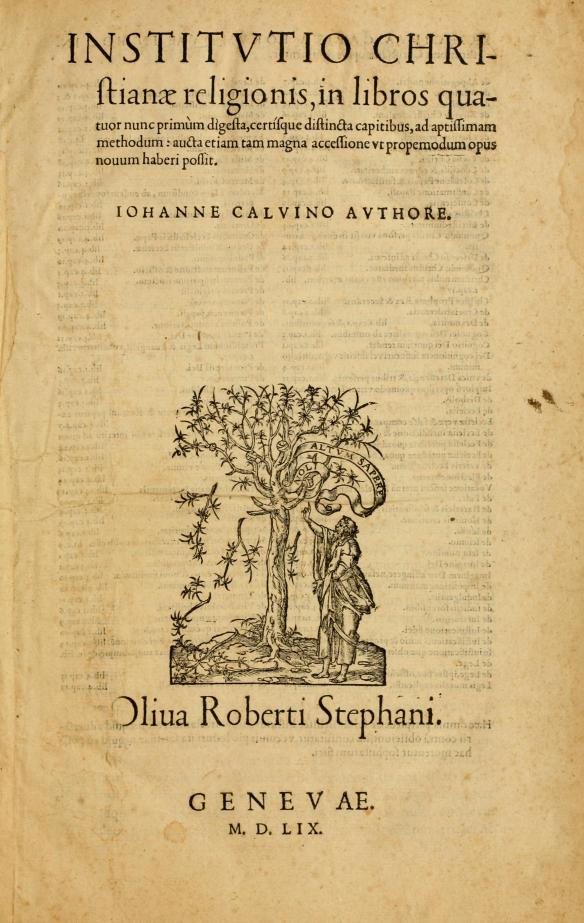A Facebook comment led me to recall the words of a 16th century theologian most people today regard as an old fuddy-duddy. First the old fuddy-duddy:
Our wisdom, in so far as it ought to be deemed true and solid Wisdom, consists almost entirely of two parts: the knowledge of God and of ourselves. But as these are connected together by many ties, it is not easy to determine which of the two precedes and gives birth to the other.

John Calvin (1504-1564) was no more a Calvinist than Jesus was a Christian. You can’t follow yourself. He didn’t. He sought wisdom. Many times his search led him to disconcerting conclusions, and actions that trouble me. But the quotation from the very first paragraph of the first page of Calvin’s Institutes of the Christian Religion is pure gold. It’s stayed with me as priceless. They could have come from Carl Jung!

The return of the prodigal son – Rembrandt drawing
Recognition of the inseparable connection between the knowledge of self and the knowledge of God is as old as philosophy and theology themselves. Augustine of Hippo wrote about coming to the knowledge of God through the knowledge of himself. “Our hearts are restless until they find their rest in Thee,” wrote St. Augustine after leading an unsavory life like the one portrayed in Jesus’ Parable of the Prodigal Son. Only by delving into the self that was deeper than his squandering was Augustine able to write his Confessions and The City of God. The search for knowledge of himself and for the knowledge of God were of one piece.
Anticipating the FBI’s expanded background check of Supreme Court nominee Brett Kavanaugh, I began to wonder what we’re seeing and how we’re seeing it in light of the two kinds of knowledge that give birth to “the true and solid Wisdom.” Then, almost by accident, I stumbled across a remarkable personal reflection on sexual abuse and sexuality on Facebook. I’d never heard of the writer until this morning. But I do know his mother, a ministerial colleague, who appears to have raised him to search for two parts of wisdom.
With the writer’s permission, we share here the LINK to the personal reflection on Facebook. It’s long, but well worth the read.
- Gordon C. Stewart, Chaska, MN, October 1, 2018.

Pingback: A Responsible Electorate | Views from the Edge
Calvinism and the Puritans who settled this region have left some truly ugly reminders of how powerful they were. I think we got lucky when the Quakers picked up a large group of followers — we are right on the edge of the line between the Puritan and Quaker groups and the first ever Quaker Meetinghouse is on the corner of our street.
I think part of my real issue with formal religion is the formal part. The religion gets lost in the laws and the rules and the traditions that somehow becomes their rules. Puritans came here to escape religious persecution and proceeded to persecute everyone else. I find that hard to wrap my head around.
LikeLike
Marilyn, no question. The Puritans were not so pure. Thank God for the Quakers! That being said, the Quakers were and are also a case of organized religion. Because it is organized, and because its tenets oppose violence and war, members of the American Friends are granted conscientious objector status. I’m using the word ‘organized’ here rather than ‘formal’ because it seems to me the preferable descriptor. I have to say, though, that I have never been a joiner. I am innately suspicious of all claims to my allegiance, any hint of a goose step acquiescence of free thought and action.
LikeLike
Me too. I’ll attend, but I never want to join because how I identify myself changes and will probably continue to change. It seems to me that everyone is so solidly SET in what they believe, there’s no room for change. But I’m always changing, sometimes a little and occasionally, an outright 180.
I do enjoy Quaker meetings, though. They are peaceful. Our local, really OLD local church no longer holds regular services but does have one on Thanksgiving morning. There’s no heat in the church — it was built in the mid-1700s. They have a sort of space heater which means you can be there at least in your overcoat and boots. When we can get ourselves out of bed early enough, it’s a good way to spend Thanksgiving morning. But join?
I think Garry is still joined to the church he grew up in (Lutheran), even though he never goes there and hasn’t in many years. He joined once as a child and that was it for him. Loyal to a fault.
LikeLike
Peaceful is what we need. Stillness. Time alone without the clanging gongs and cymbals. Quaker meetings provide that — AND they provide a community of conscience with which to do it.
LikeLike
Thanks!
LikeLike
You’re welcome.
LikeLike